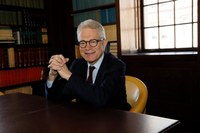David Freedberg will receive the Sigillum Magnum of the University of Bologna
Pierre Matisse Professor of Art History and Director of the Italian Academy for Advanced Studies in America at Columbia University, a scholar and one of the most authoritative living art historians, David Freedberg will receive the highest honour from the Alma Mater during an academic ceremony in the Aula Absidale Santa Lucia.

Well-known art historian David Freedberg will receive the Sigillum Magnum of the University of Bologna, the highest honour of the Alma Mater, from Rector Francesco Ubertini during an academic ceremony to be held on Wednesday, 10 October at 5 pm in the Aula Absidale Santa Lucia.
The event is presented in collaboration with Genus Bononiae - Musei nella Città and the Accademia Nazionale di Agricoltura di Bologna, which will confer the title of Honorary Academician to the scholar on 8 October at the Aula Magna of the Accademia di Belle Arti in Bologna.
In 2015, Freedberg was appointed Director of the Warburg Institute in London, while also a visiting professor at the Universities of Groningen, Oxford, Brussels, etc., and a professor at Columbia University. Freedberg’s work demonstrates his commitment to an interdisciplinary approach that interacts with the different cultural territories that his research has often brilliantly intertwined while remaining free from academic superstructures.
His initial studies on art and painting of the sixteenth and seventeenth centuries were followed by research focusing on the visual rendering of natural and scientific discoveries in the modern age. This interest led him to examine the relationship between art and science, developing an approach that definitively rejects the idea of a single vision of art to adopt a more open stance that includes the use of the tools offered by the sciences.
For more than a decade, Freedberg has reflected upon on the importance of neuroscience in understanding human responses to art and images, dedicating a considerable part of his activities to collaborations with neuroscientists interested in a scientific, sensory-motor approach to cognition and the study of these reactions.
Together with the large group of researchers in Parma revolving around Giacomo Rizzolati and Vittorio Gallese, Freedberg traces the neuronal bases of responses to images, showing how the use of scientific tools can help us understand issues relating to art that, as of today, remain unresolved.
The results of these studies are not limited to the history of art. Dealing with iconoclasm, damnatio memoriae, censorship and, above all, empathy and idolatry, Freedberg’s work overcomes the merely aesthetic aspects of art because, investigating its importance with respect to life, politics and the ethical mechanisms that move societies, it questions substantial issues concerning human nature in its broadest sense.
